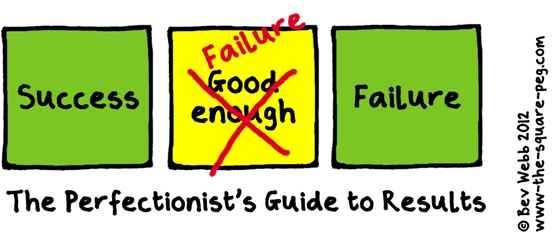
Perfectionism doesn’t propel anyone to success, getting the job done does. We have to see that these 2 do not go hand in hand. Perfectionism drowns the person in needless worries and delays them from getting anything done.
During the closing of a school term, students send their drafts to their lecturers for vetting and corrections. Normally, students send one draft or even none. What I do enjoy is seeing the bold and confident students who just hand their work saying “this is not a draft, this is my submission.” Of course, life is not always that smooth, for there are ones who will submit a draft and resubmit a draft, and re-resubmit a draft. I actually had a student whom I had to force to finally submit their work after 6 drafts!
As a Psychologist, I spend half my time theorizing and identifying the root of the problem. I honestly do not pay much attention to symptoms which I find extremely superficial. Though the behaviour may be connected to many names such as Obsessive-Compulsive Personality, procrastination, or even anal retention, the root of this problem is negative perfectionism. This is a type of perfectionism that is motivated from the fear of making mistakes or that of the fear of failing.

As parents would ingrain in our minds not to do anything unless we’re giving it our best; I, in turn, tell my students that submitting a mediocre work is far better than not submitting anything at all. And much to my surprise, a lot of students can’t seem to let go of their old work habits.
To help out our student friends who are stressed out from the seeming demands of perfectionism, I’m sharing 4 useful tips to begin the change to freedom:
#1. Knowing that Perfectionism is a myth
Perfectionism doesn’t propel anyone to success, getting the job done does. We have to see that these 2 do not go hand in hand. Perfectionism drowns the person in needless worries and prevents them from getting anything done.
We have to start seeing perfectionism as an enemy if we are to be free from it. Don’t get me wrong, perfectionism can be a helpful tool, but if it takes a person more than 5 hours to scan through a 1500 word essay, then something has to be done about it.
#2. Inoculation
Get yourself accustomed to unavoidable mistakes and once you do, process that experience and see that nothing devastating has or will occur. When I suggest this to perfectionistic clients, I am training them to change their attitudes (and therefore their emotional reactions) towards mistakes and failure. To fear an enemy is to be defeated by it and this is why we train ourselves to laugh at our mistakes instead of cry over them.

Be comfortable with grey areas. Perfectionsists are known to be black and white thinkers. Not being comfortable with middle grounds, such as a mark of “B”, they would rather jump to the black side and claim failure. From your inoculation (desensitization) exercises, bring yourself to situations that will make you more familiar with grey or middle results.
#3. Just Take the Plunge
Omit needless planning, rituals and unnecessary steps. Over-thinking paralyzes the person and prevents him from action. Instead of reading and re-reading an already vetted email, why don’t you just click the SEND button?
#4. Focus on things that you have to do next
Once the task is done, it is time to march on forward. Your previous task is now part of the past and you have to move on from it. DO NOT go back worrying about what has passed while knowing that there is nothing else we can do about it. Set your eyes towards the future.

There is no reason to hate your studies or your work, as long as you don’t let it consume you.
For people suffering from these fears which leads to an unhealthy dose of ritualistic perfectionism, you can start off with these 4 tips. You will suddenly realize that you have gained this new found freedom coupled with some fresh supply of time you have saved by freeing yourself from the needless fears generated by the demands of perfectionism.